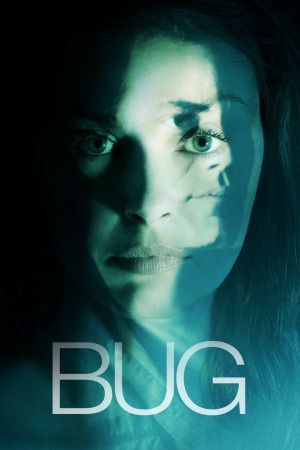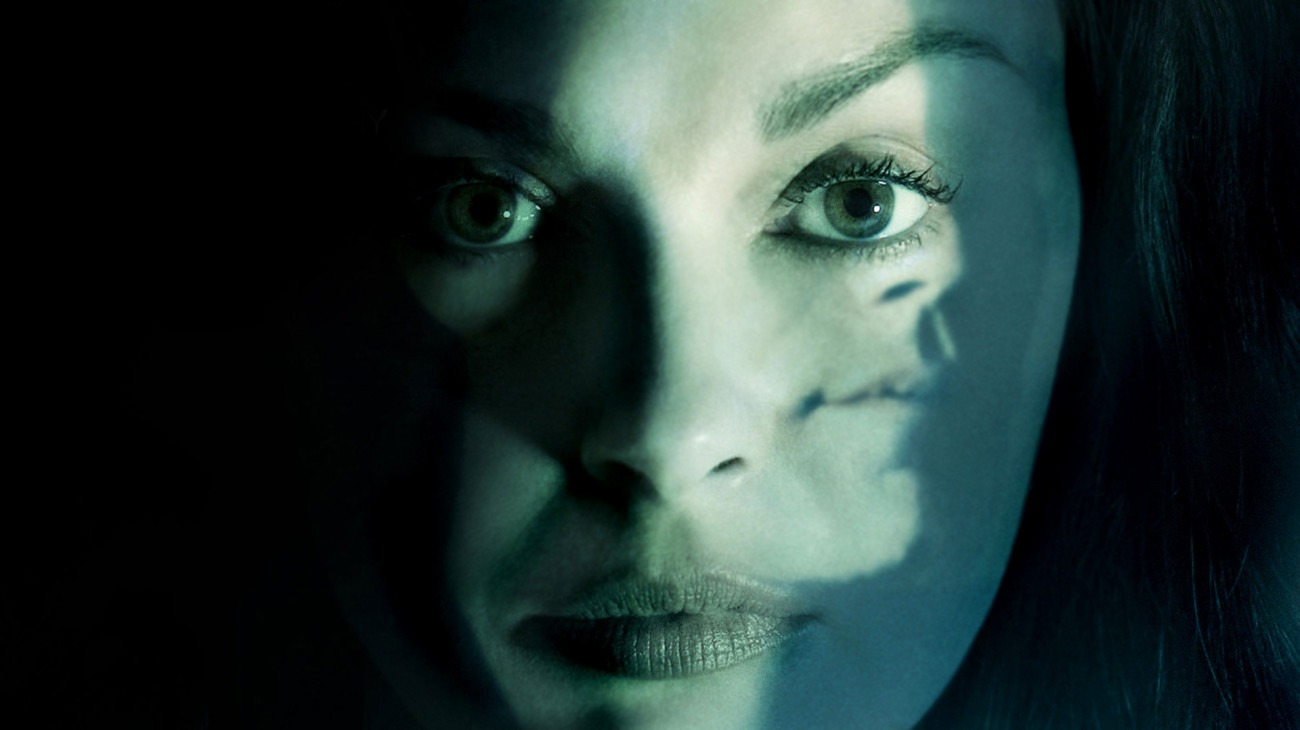
Creepy-crawlies
Eventually we'll all stop seeing movies in theaters, favoring same-day HD downloads onto our 150" flat panel TVs, and that thought makes me incredibly sad, for as I and many others have said many times, the communal aspect of filmgoing is really a very special thing. Being in the dark with strangers and absorbing their response with your own has a peculiar kind of intimacy. Then there are the other times, when you sit in the dark and listen to how all of those strangers are reacting, and (if you are me), you find yourself thinking, "Jesus Christ, I am so much smarter than these people."
To be fair, I had some help in appreciating Bug, which is that I have read Tracy Letts's original play and therefore I was prepared for the film as it is, and not the Cronenberg-esque horror film that the marketing promised. So it's not that I'm "smarter" than everybody else, merely that I'm better-informed, which presumably speaks to a greater curiosity and openness to the world, but I just got off that road and I shouldn't really go back down it right away.
Bug, directed by former genius William Friedkin and written by Letts (who is also a fantastic actor, and a member of the Steppenwolf Theatre ensemble, which I mention both out of hometown pride, and because I saw him last year in The Pillowman and he was incredible), is a horror story, when all is said and done, but it is not "that kind" of horror story. It is an internal, personal story of drug-induced paranoia and the abject fear of being alone. Herein we find Agnes (Ashley Judd), who is scratching out a simulacrum of life in a rundown Oklahoma town, hiding from her violent ex-con ex-husband Jerry Goss (Harry Connick, Jr.). Comes a time that her lesbian best friend, R.C. (Lynn Collins) brings a quiet drifter named Peter Evans (Michael Shannon, who was also incredible in The Pillowman) over to Agnes's grim little hotel room; Agnes and Peter hit it off, and that's when the really crazy shit happens, ending with the two racing each other to the most hideous depths of mental derangement, aided by the elliptical presence of multiple narcotics.
It's pretty safe to say that American culture demands a higher degree of realism from film than from theater, and accepts greater intensity from life performance, and on both of those counts, Bug is quite a bit more theatrical than cinematic, which doubtlessly explains the hostile reception of my audience, and seemingly of audiences throughout the country; but I've never pretended that I have any interest in that false dichotomy. By my reckoning, this is indeed a brilliant combination of the limitations of both stage and film, combined under Friedkin's unexpectedly sure guidance into a movie that wears its theatrical roots like a badge, while somehow proving in every single shot that it is essentially cinematic.
Friedkin's style here is not subtle; he uses frames-within-frames and editing like tactical nuclear arms to emphasise the shift from personal isolation in the beginning of the film to the literally insane codependency of the climax. But this is not a case where subtlety is expected or appropriate - this is, for god's sake, a story in which flesh-eating aphids are used as a metaphor for paranoid schizophrenia. It's an emotionally "big" story, and Friedkin's heightened visual language is a perfect fit for the theatricality of it all. It's supposed to be larger than reality, and it is, and it's a wonderful thing to behold if you're on the same page as the material.
Not that the film is all visual: following the author's intent, Bug is incredibly, aggressively aural. Throughout, we hear helicopter blades, whether there is a helicopter at any given moment or not; and scene transitions are conducted (sometimes with less success than others) with explosions of raw noise. In other words, the sound design brings us into the characters' deteriorating minds, while the visuals keep us at the level of spectators.
Being written by an actor and born in the theater, it is perhaps not surprising that Bug offers a pair of extraordinarily ripe central characters, and the actors involved tear into the material with élan. It's not surprising that Michael Shannon does great things with Peter; he's played the role onstage to great praise in the past, and so he's had plenty of time to work out the kinks in the character's slow boil over the 100 minutes of plot. No, it's Ashley Judd who really comes from nowhere to nail a terrifically hard role with a flawless performance of a descent into insanity that is as disturbing to witness as anything in the modern cinema, especially in her showstopping climactic speech where she essentially breaks down over the course of five minutes, culminating in a line that will either terrify you (if you are on the movie's wavelength) or make you giggle like a schoolgirl (if you are a fucking cobag like the fucking cobags in the theater where I saw the film).
Schizophrenia is not fun to watch, and more than most things, I suppose Bug is really not an accessible movie. It's already clear that it's a love it or hate it affair, and I'm quite grateful that I love it, because it's a terrifically challenging experience, especially buried in the middle of summer where its merits will be surely disposed of by a crowd looking for the easy entertainment. Quite a pity, that. This is an exemplary character-driven chamber drama like we don't see much of in America, and its exaggerated psychotic energy is a perfect antidote to the flaccid objets d'argent that sit a screen or two away, raking in unholy mounds of cash while evincing not the slightest hint of personality.
8/10
To be fair, I had some help in appreciating Bug, which is that I have read Tracy Letts's original play and therefore I was prepared for the film as it is, and not the Cronenberg-esque horror film that the marketing promised. So it's not that I'm "smarter" than everybody else, merely that I'm better-informed, which presumably speaks to a greater curiosity and openness to the world, but I just got off that road and I shouldn't really go back down it right away.
Bug, directed by former genius William Friedkin and written by Letts (who is also a fantastic actor, and a member of the Steppenwolf Theatre ensemble, which I mention both out of hometown pride, and because I saw him last year in The Pillowman and he was incredible), is a horror story, when all is said and done, but it is not "that kind" of horror story. It is an internal, personal story of drug-induced paranoia and the abject fear of being alone. Herein we find Agnes (Ashley Judd), who is scratching out a simulacrum of life in a rundown Oklahoma town, hiding from her violent ex-con ex-husband Jerry Goss (Harry Connick, Jr.). Comes a time that her lesbian best friend, R.C. (Lynn Collins) brings a quiet drifter named Peter Evans (Michael Shannon, who was also incredible in The Pillowman) over to Agnes's grim little hotel room; Agnes and Peter hit it off, and that's when the really crazy shit happens, ending with the two racing each other to the most hideous depths of mental derangement, aided by the elliptical presence of multiple narcotics.
It's pretty safe to say that American culture demands a higher degree of realism from film than from theater, and accepts greater intensity from life performance, and on both of those counts, Bug is quite a bit more theatrical than cinematic, which doubtlessly explains the hostile reception of my audience, and seemingly of audiences throughout the country; but I've never pretended that I have any interest in that false dichotomy. By my reckoning, this is indeed a brilliant combination of the limitations of both stage and film, combined under Friedkin's unexpectedly sure guidance into a movie that wears its theatrical roots like a badge, while somehow proving in every single shot that it is essentially cinematic.
Friedkin's style here is not subtle; he uses frames-within-frames and editing like tactical nuclear arms to emphasise the shift from personal isolation in the beginning of the film to the literally insane codependency of the climax. But this is not a case where subtlety is expected or appropriate - this is, for god's sake, a story in which flesh-eating aphids are used as a metaphor for paranoid schizophrenia. It's an emotionally "big" story, and Friedkin's heightened visual language is a perfect fit for the theatricality of it all. It's supposed to be larger than reality, and it is, and it's a wonderful thing to behold if you're on the same page as the material.
Not that the film is all visual: following the author's intent, Bug is incredibly, aggressively aural. Throughout, we hear helicopter blades, whether there is a helicopter at any given moment or not; and scene transitions are conducted (sometimes with less success than others) with explosions of raw noise. In other words, the sound design brings us into the characters' deteriorating minds, while the visuals keep us at the level of spectators.
Being written by an actor and born in the theater, it is perhaps not surprising that Bug offers a pair of extraordinarily ripe central characters, and the actors involved tear into the material with élan. It's not surprising that Michael Shannon does great things with Peter; he's played the role onstage to great praise in the past, and so he's had plenty of time to work out the kinks in the character's slow boil over the 100 minutes of plot. No, it's Ashley Judd who really comes from nowhere to nail a terrifically hard role with a flawless performance of a descent into insanity that is as disturbing to witness as anything in the modern cinema, especially in her showstopping climactic speech where she essentially breaks down over the course of five minutes, culminating in a line that will either terrify you (if you are on the movie's wavelength) or make you giggle like a schoolgirl (if you are a fucking cobag like the fucking cobags in the theater where I saw the film).
Schizophrenia is not fun to watch, and more than most things, I suppose Bug is really not an accessible movie. It's already clear that it's a love it or hate it affair, and I'm quite grateful that I love it, because it's a terrifically challenging experience, especially buried in the middle of summer where its merits will be surely disposed of by a crowd looking for the easy entertainment. Quite a pity, that. This is an exemplary character-driven chamber drama like we don't see much of in America, and its exaggerated psychotic energy is a perfect antidote to the flaccid objets d'argent that sit a screen or two away, raking in unholy mounds of cash while evincing not the slightest hint of personality.
8/10






